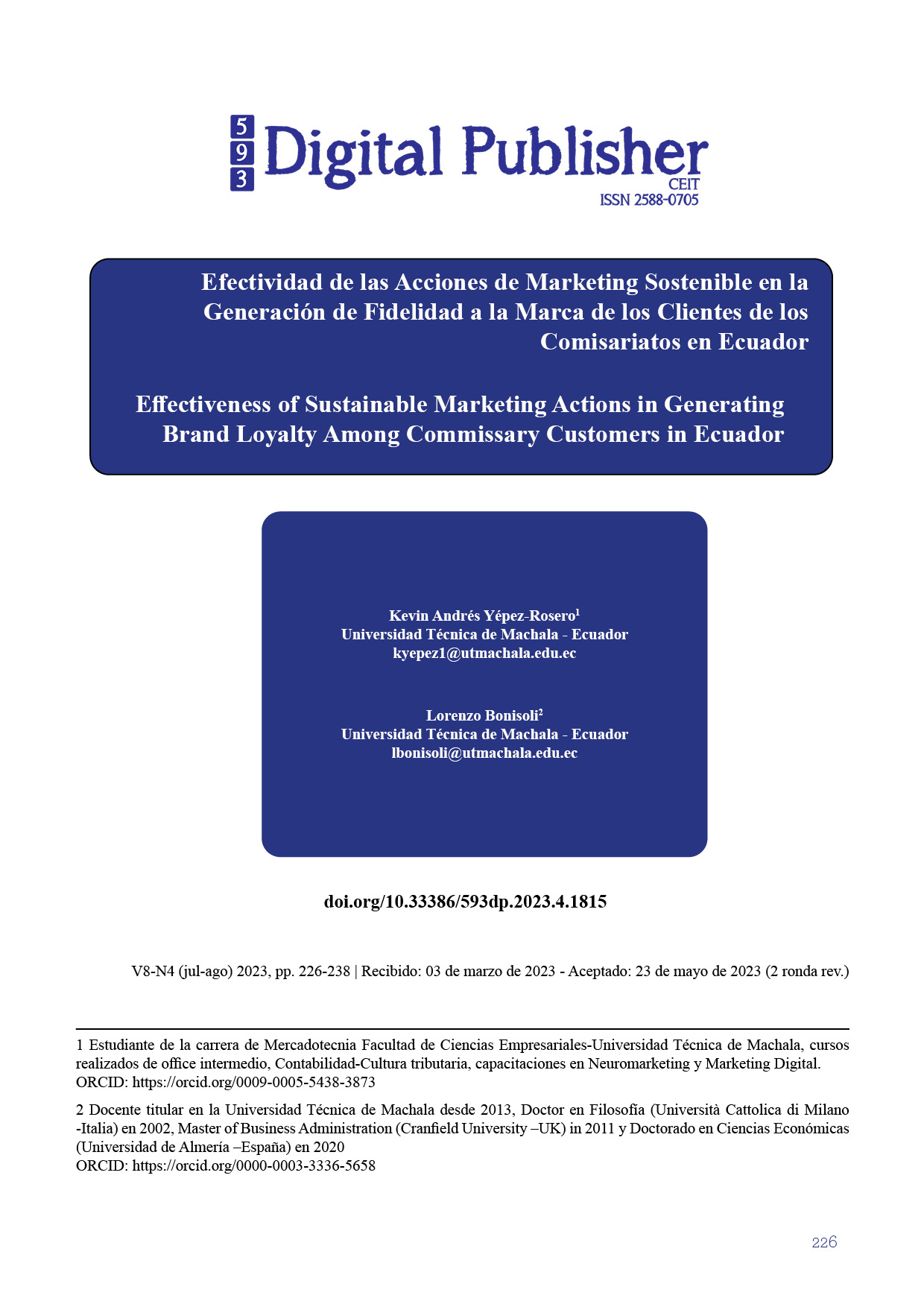Effectiveness of Sustainable Marketing Actions in Generating Brand Loyalty Among Commissary Customers in Ecuador.
Main Article Content
Abstract
Currently, companies are involved in offering sustainable products which manifest qualities that make them different from traditional products through differentiated packaging where they show environmental certification thus validating their interest in the care and welfare of the environment, as a result of this is born what is known as sustainable development term based on a concept of socio-economic development whose purpose is to ensure a life of quality and fullness for all. Many organisations are involved in offering sustainable products, in Ecuador they do it under the commissaries or also known as hypermarkets, which belong to the retail sector and attract people of different economic conditions.
Having said that, the main objective of this study is to analyse the perception and sensitivity of the consumers of the commissaries in Ecuador to the application of sustainable actions that demonstrate their interest in the well-being of the environment. To carry it out, it was carried out under a quantitative approach, by means of an exploratory and empirical type of research, and to analyse the data, the PLS-SEM method was used, where it was stated that sustainability practices by companies are effective in creating long-term consumer value and loyalty.
Downloads
Article Details

This work is licensed under a Creative Commons Attribution-NonCommercial-ShareAlike 4.0 International License.
1. Derechos de autor
Las obras que se publican en 593 Digital Publisher CEIT están sujetas a los siguientes términos:
1.1. 593 Digital Publisher CEIT, conserva los derechos patrimoniales (copyright) de las obras publicadas, favorece y permite la reutilización de las mismas bajo la licencia Licencia Creative Commons 4.0 de Reconocimiento-NoComercial-CompartirIgual 4.0, por lo cual se pueden copiar, usar, difundir, transmitir y exponer públicamente, siempre que:
1.1.a. Se cite la autoría y fuente original de su publicación (revista, editorial, URL).
1.1.b. No se usen para fines comerciales u onerosos.
1.1.c. Se mencione la existencia y especificaciones de esta licencia de uso.
References
Abuzaid, H., Almashhour, R., Mohammed, A., & Beheiry, S. (2022). Assessment of the Perception of Sustainability for Occupants of Residential Buildings: A Case Study in the UAE. Journal Buildings, 12(7), 994. https://doi.org/10.3390/buildings12070994
Ajmal, M. M., Khan, M., Hussain, M., & Helo, P. (2018). Conceptualizing and incorporating social sustainability in the business world. Int. J. Sustainable Dev. World Ecol., 25(4), 327–339. https://doi.org/10.1080/13504509.2017.1408714
Blaise, I. I. P., Mpinganjira, M., & Roberts-Lombard, M. (2019). Modelling green customer loyalty and positive word of mouth: Can environmental knowledge make the difference in an emerging market? International Journal of Emerging Markets, 15(3), 405–426. https://doi.org/10.1108/IJOEM-09-2018-0489
Borges, N., & Janissek-Muniz, R. (2021). Perceived value of organizational foresight processes: effects of the illusion of control and individual foresight. BBR, Braz. Bus. Rev., 18(5), 516–536. https://doi.org/10.15728/bbr.2021.18.5.3
Chrisjatmiko, K. (2018). Towards green loyalty. the influences of green perceived risk, green image, green trust and green satisfaction. IOP Conference Series: Earth and Environmental Science., 106(1), 012085. https://doi.org/10.1088/1755-1315/106/1/012085
Cope, M. R., Kernan, A. R., Sanders, S. R., & Ward, C. (2022). Social Sustainability?: Exploring the Relationship between Community Experience and Perceptions of the Environment. Sustainability, 14(3). https://doi.org/10.3390/su14031935
Fiallos, G. (2021). La Correlación de Pearson y el proceso de regresión por el Método de Mínimos Cuadrados. Ciencia Latina Revista Científica Multidisciplinar, 5(3), 2491–2509. https://doi.org/10.37811/cl_rcm.v5i3.466
Gerekan, B., Pehlivan, A., & Koçan, M. (2019). The Effect of Firm Growth on Brand Value: Evidence from Brand Finance Turkey-100. Asian Economic and Financial Review, 9(9), 1067–1076. https://doi.org/10.18488/journal.aefr.2019.99.1067.1076
Gupta, S., Gallear, D., Rudd, J., & Foroudi, P. (2020). The impact of brand value on brand competitiveness. J. Bus. Res., 112, 210–222. https://doi.org/10.1016/j.jbusres.2020.02.033
Juliana, Djakasaputra, A., & Pramono, R. (2020). Green perceived risk, green viral communication, green perceived value against green purchase intention through green satisfaction. Journal industrial engineering & management research ( JIEMAR), 1(2), 124–139. https://doi.org/10.7777/jiemar.v1i2
Junior, S. B., Martínez, M. P., Correa, C. M., Moura-Leite, R. C., & da Silva, D. (2019). Greenwashing effect, attitudes, and beliefs in green consumption. RAUSP Management Journal, 54(2), 226–241. https://doi.org/10.1108/rausp-08-2018-0070
Klarin, T. (2018). The Concept of Sustainable Development: From its Beginning to the Contemporary Issues. Zagreb International Review of Economics and Business, 21(1), 67–94. https://doi.org/10.2478/zireb-2018-0005
Kowalska, M. (2020). SME Managers’ Perceptions of Sustainable Marketing Mix in Different Socioeconomic Conditions—A Comparative Analysis of Sri Lanka and Poland. Sustain. Sci. Pract. Policy, 12(24), 10659. https://doi.org/10.3390/su122410659
Kruger, S. D., Zanin, A., Três, N., & Magro, C. B. D. (2021). Práticas de sustentabilidade adotadas por empresas industriais. Rev. Adm. UFSM, 14, 1140–1159. https://doi.org/10.5902/1983465963908
Kucharska, W., Flisikowski, K., & Confente, I. (2018). Do global brands contribute to the economy of their country of origin? A dynamic spatial approach. Journal of Product & Brand Management, 27(7), 768–780. https://doi.org/10.1108/JPBM-10-2017-1641
Lakatos, E.-S., Nan, L.-M., Bacali, L., Ciobanu, G., Ciobanu, A.-M., & Cioca, L.-I. (2021). Consumer Satisfaction towards Green Products: Empirical Insights from Romania. Sustainability, 13(19), 15. https://doi.org/10.3390/su131910982
Laukkanen, M., & Tura, N. (2022). Sustainable value propositions and customer perceived value: Clothing library case. J. Clean. Prod., 378, 134321. https://doi.org/10.1016/j.jclepro.2022.134321
Lin, W. L., Ho, J. A., Sambasivan, M., Yip, N., & Mohamed, A. bin. (2021). Influence of green innovation strategy on brand value: The role of marketing capability and R&D intensity. Technol. Forecast. Soc. Change, 171, 120946. https://doi.org/10.1016/j.techfore.2021.120946
Lin, Y.-H., Lee, T.-H., & Wang, C.-K. (2021). Influence Analysis of Sustainability Perceptions on Sense of Community and Support for Sustainable Community Development in Relocated Communities. Int. J. Environ. Res. Public Health, 18(22). https://doi.org/10.3390/ijerph182212223
Mofidi Chelan, M., Alijanpour, A., Barani, H., Motamedi, J., Azadi, H., & van Passel, S. (2018). Economic sustainability assessment in semi-steppe rangelands. Sci. Total Environ., 637–638, 112–119. https://doi.org/10.1016/j.scitotenv.2018.04.428
Moisescu, O. I., Gică, O. A., Müller, V. O., & Müller, C. A. (2019). Can Corporate Fairness towards Public Authorities Enhance Customer Loyalty? A Multi-Sectorial Investigation in a Developing Country. Sustain. Sci. Pract. Policy, 12(1), 187. https://doi.org/10.3390/su12010187
Moisescu, O.-I. (2018). From perceptual corporate sustainability to customer loyalty: a multi-sectorial investigation in a developing country. Economic Research-Ekonomska Istraživanja, 31(1), 55–72. https://doi.org/10.1080/1331677X.2017.1421998
Nanggong, A., & Rahmatia, R. (2019). Perceived Benefit, Environmental Concern and Sustainable Customer Behavior on Technology Adoption. The Asian Journal of Technology Management (AJTM), 12(1), 31–47. https://doi.org/10.12695/ajtm.2019.12.1.3
Pahlevi, M. R., & Suhartanto, D. (2020). The integrated model of green loyalty: Evidence from eco-friendly plastic products. J. Clean. Prod., 257, 120844. https://doi.org/10.1016/j.jclepro.2020.120844
Piper, L., de Cosmo, L. M., Sestino, A., Giangrande, A., Stabili, L., Longo, C., & Guido, G. (2021). Perceived social welfare as a driver of green products consumption: Evidences from an integrated multi-trophic aquaculture production. Current Research in Environmental Sustainability, 3, 100081. https://doi.org/10.1016/j.crsust.2021.100081
Rivera-Ferre, M. (2022). Climate change is not equal to all: The contribution of feminist studies to climate change research. Mètode Science Studies Journal, 12, 131–135. https://doi.org/10.7203/metode.12.20508
Severo, E. A., Guimarães, J. C. F. de, Dellarmelin, M. L., & Ribeiro, R. P. (2019). The Influence of Social Networks on Environmental Awareness and the Social Responsibility of Generations. BBR - Brazilian Business Review, 16(5), 500–518. https://doi.org/10.15728/bbr.2019.16.5.5
Silva de Souza, D. E., & Baldanza, R. F. (2018). The e-consumer in light of the perceived value theory: A study on the acceptance of mobile commerce. Base Revista de Administração e Contabilidade da UNISINOS, 15(3), 238–253. https://www.redalyc.org/articulo.oa?id=337260224006
Strenitzerová, M., & Gaňa, J. (2018). Customer Satisfaction and Loyalty as a Part of Customer-Based Corporate Sustainability in the Sector of Mobile Communications Services. Sustain. Sci. Pract. Policy, 10(5), 1657. https://doi.org/10.3390/su10051657
Sun, H., Rabbani, M. R., Ahmad, N., Sial, M. S., Cheng, G., Zia-Ud-Din, M., & Fu, Q. (2020). CSR, Co-Creation and Green Consumer Loyalty: Are Green Banking Initiatives Important? A Moderated Mediation Approach from an Emerging Economy. Sustain. Sci. Pract. Policy, 12(24), 10688. https://doi.org/10.3390/su122410688
Trivedi, K., Trivedi, P., & Goswami, V. (2018). Sustainable marketing strategies: Creating business value by meeting consumer expectation. International Journal of Management, Economics and Social Sciences., 7(2), 186–205. https://www.econstor.eu/bitstream/10419/180785/1/full-3.pdf
Westin, L., Hallencreutz, J., & Parmler, J. (2022). Sustainable Development as a Driver for Customer Experience. Sustainability, 14(6), 3505. https://doi.org/10.3390/su14063505



